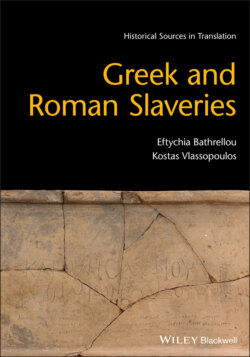Читать книгу Greek and Roman Slaveries - Eftychia Bathrellou - Страница 33
1.22 Aulus Gellius, Attic Nights, 1.26.3–9: Latin Miscellany of Learned Material (Second Century CE)
ОглавлениеAulus Gellius here reports part of the answer given to him by Lucius Calvinus Taurus, a contemporary Platonist philosopher, when he asked him whether wise men ever got angry. Plutarch, another Platonist, was an influential philosopher and biographer.
Literature: Harris 2001: 317–36; Klees 2005; Hunt 2016; Lenski 2016.
“This is what I think,” Taurus said, “about getting angry. But it would do no harm to hear, also, what our Plutarch, an extremely learned and wise man, thought. Plutarch,” he said, “once gave orders that a slave of his, a worthless and insolent fellow but with ears filled with philosophical works and arguments, be stripped of his tunic for I don’t know what offence, and whipped. The beating had started, and he kept protesting that he had not done anything deserving flogging – he had not been guilty of anything wrong or criminal. In the end, amid the flogging, he began to shout – no longer making complaints, groans, and laments but serious and reproachful arguments: that Plutarch’s behavior was improper for a philosopher; that it was shameful to get angry; that Plutarch had often lectured on the evil of anger and had even written a very fine book On Lack of Anger, and that it was not compatible with anything of what was written in the book that he, submitting and yielding to anger, punished him with many blows.
“Then Plutarch spoke, calmly and mildly. ‘Oh you who deserve to be under the whip, do I now seem angry to you? Is it from my face, or from my voice, or my complexion or, even, from my words that you perceive I’ve been seized by anger? I think that neither my eyes are fierce, nor is my face wild, nor am I shouting uncontrollably, nor am I raging to the point of foaming around the mouth or turning red, nor am I saying words to be ashamed of or regret, nor am I trembling or gesticulating because of anger. For, in case you don’t know it, all these things are the typical signs of anger.’ And, turning at the same time toward the one who was whipping the slave, he said: ‘Meanwhile, while this fellow and I are arguing, you continue your task.’”
How does the slave initially attempt to avoid punishment? How does this relate to 1.21?
What is the second argument that he uses? Does it work?
How is Plutarch’s emotional state portrayed in this passage? Can we learn something about masters’ mentality from Plutarch’s response?
How does this master–slave negotiation relate to that described in 1.19?
What conclusions should we draw from the fact that the slave has learned some of his master’s philosophy?
What conclusions can we draw about slave agency from this passage?
How does this passage illustrate both the asymmetry and the negotiation that slavery involves?
